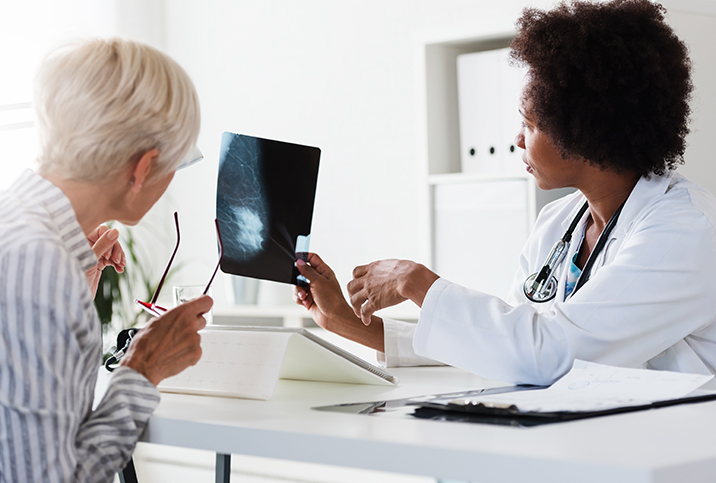New FDA Rule Mandates Breast Density Awareness in Mammogram Reports

Key Points
- Almost 50 percent of women over 40 who get mammograms have dense breasts.
- Many women are unaware that breast density can affect cancer risk and detection.
- The FDA's new 2024 rule mandates that all mammography providers notify women of their breast density and urge them to talk with their doctor about potential next steps, such as supplemental testing, if appropriate.
Many women don't realize breast density affects mammogram results, making it harder to detect cancer. Those with dense breasts are also more likely to develop breast cancer.
To ensure women understand their risks and options, the U.S. Food and Drug Administration (FDA) implemented a new rule, effective September 10, 2024, requiring all mammography reports and result letters to disclose women's breast density and describe its implications.
Why does the FDA require disclosing breast density in mammogram reports?
The United States Preventive Services Task Force (USPSTF) recommends women start regular breast cancer screenings at age 40. Almost 50 percent of women over 40 who get mammograms have dense breasts, according to the National Cancer Institute (NCI).
However, many women don't know that they have dense breasts or what breast density may mean to them.
Breasts contain glandular, fibrous connective and fatty breast tissues. People with dense breasts have relatively high amounts of fibroglandular tissue and low amounts of fatty breast tissue.
Fibroglandular tissue and tumors both appear white on mammogram images, making it harder for healthcare providers to identify small tumors.
The FDA's new amendment to the Mammography Quality Standards Act (MQSA) will help women make informed choices about breast cancer prevention and screening by educating them about how dense breasts can obscure imaging and raise cancer risk, and urging them to speak with their doctor for individualized guidance.
The FDA issued the rule on March 10, 2023, but delayed implementation to give healthcare providers more time to comply.
Why does breast density matter?
Breast density matters because, in addition to obscuring mammogram images, it is a significant breast cancer risk factor.
Women with very dense breasts have a four to fivefold greater likelihood of developing breast cancer than those with fatty breasts, according to the Susan G. Komen Foundation.
It's unclear why, but it may be that cancer cells often grow in dense glandular tissue. However, it's important to note that breast density doesn't influence a person's risk of dying from breast cancer.
Experts don't know for sure what causes breast cancer, but some people are much more likely to get it than others. Other characteristics associated with increased risk for breast cancer include:
- Sex (women are 100 times more likely than men to develop breast cancer)
- Age 55 or older
- A family history of breast cancer
- A mutated BRCA gene
- A history of radiation to the chest or face before age 30
- Certain benign breast changes
- Early puberty
- Smoking
- Overweight status
Recommended
- Why Breast Density Matters: Breast density may not affect a woman's day-to-day life, but breast density is linked to breast cancer.
- Breast Density: Myths & Misconceptions: Misconceptions about breast density abound, so it's important to know the facts.
- What Breast Density Says About Your Future Breast Health: Do you have high or low breast density? Here's what you need to know.
Some lesser-known risk factors for breast cancer include the following, per the organization:
- Low vitamin D levels
- Exposure to light at night
- An unhealthy diet
- Exposure to chemicals in some hair dyes, straighteners and cosmetics
- Exposure to certain chemicals in food, lawn and garden products
How often should you get tested?
Testing for breast cancer should begin at age 40 and most people should consider getting tested annually thereafter. Screening mammograms can find breast cancer early and that increases the opportunity to cure the disease.
Studies have shown that regular testing can decrease the risk of dying of breast cancer.
Women with dense breasts or other risk factors may need to get more frequent screenings than their peers. Those with dense breasts may also benefit from additional or different testing methods.
For instance, research suggests that 3D mammography, or digital breast tomosynthesis, is much more effective than 2D mammography at detecting tumors in people with dense breasts.
Additionally, a doctor may recommend a woman with dense breasts undergo breast ultrasounds or magnetic resonance imaging (MRI) in conjunction with mammograms, as these tests can produce more comprehensive and accurate images.
However, those with dense breasts should consult their doctor for personalized recommendations. Not everyone with dense breasts will benefit from supplemental breast cancer screening, and insurance doesn't always cover these tests.
What factors contribute to breast density?
Research suggests genetics play a role in breast density, like breast cancer. Other factors can also contribute.
Women under age 50, for example, tend to have denser breasts than those who've gone through menopause. However, older women can also have dense breasts, and menopausal hormone replacement therapy may increase breast density.
Women with lower body mass indexes or lower body fat percentage are more likely to have dense breasts as well.
Can you change your breast density?
Breast density can be reduced using tamoxifen, a selective estrogen receptor modulator (SERM) medication that is sometimes prescribed to people at increased risk of breast cancer.
However, there are other ways to reduce your risk for breast cancer.
Ways to reduce your breast cancer risk include:
- Getting genetic testing and counseling
- Taking preventive medications like tamoxifen or raloxifene, which block estrogen in breast tissue, or aromatase inhibitors
- Undergoing preventive surgery if you're at very high risk
- Dietary changes include consuming fewer processed and red meats or sugary drinks and lots of fruits and vegetables
- Getting enough vitamin D
Giving birth can also lower breast density. Studies have indicated that women who have given birth have a lower risk of having dense breasts than women who have not, indicated a 2022 report.
The bottom line
Having dense breasts can raise your chances of developing breast cancer and may make screening more complicated. However, having regular mammograms that factor in dense breast tissue can help reduce your risk.
As with other risk factors, having dense breasts doesn't necessarily mean you will get breast cancer, but supplemental testing or treatments can help you avoid the disease. Speak to your healthcare provider to learn more.


















